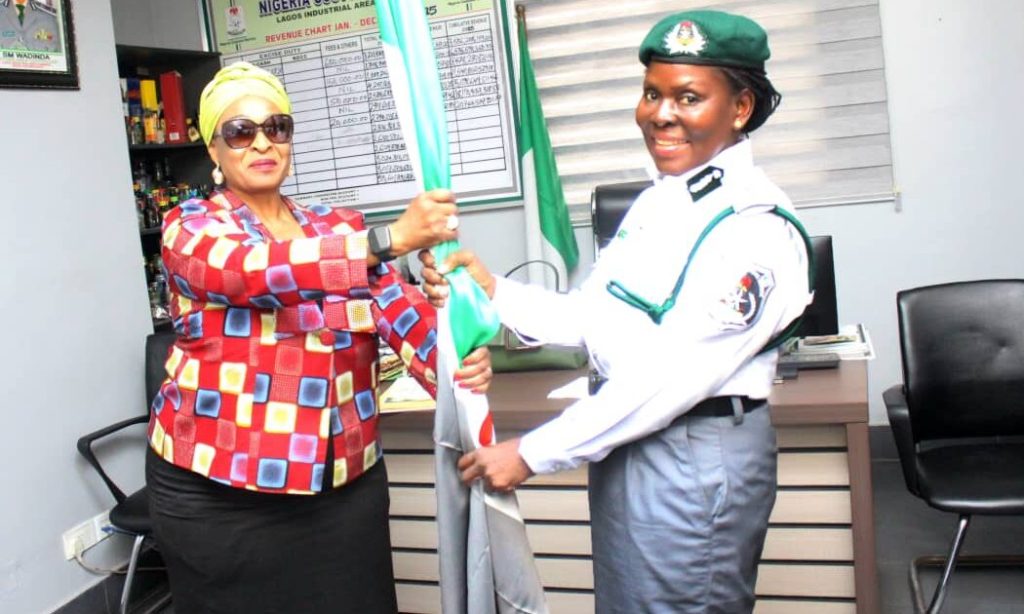The Nigeria Customs Service (NCS) witnessed a changing of the guard at the Lagos Industrial Area Command as Adebola Salawu assumed the role of Customs Area Controller (CAC), taking the reins from the retiring Sarah Wadinda. Salawu’s arrival marked a new chapter for the command, bringing with it a renewed focus on leveraging technology and collaboration to enhance excise performance and contribute to national economic growth. Salawu, in her inaugural address, emphasized the importance of the newly implemented Unified Customs Management System, known as ‘B’Odogwu,’ as a key tool for achieving these objectives. She encouraged officers to embrace the system and participate in in-house training sessions to maximize its potential. Furthermore, Salawu highlighted the importance of stakeholder engagement as a critical component of success, signaling a commitment to fostering strong partnerships with businesses and other relevant parties within the Lagos industrial area.
The handover ceremony served not only as a welcome for the incoming CAC but also as a farewell and recognition of the contributions of the outgoing controller, Sarah Wadinda. Wadinda expressed gratitude to the Comptroller-General of Customs, Adewale Adeniyi, for the opportunity to serve and highlighted her achievements during her tenure. She emphasized the successful completion of several Corporate Social Responsibility (CSR) projects, notably the ‘Customs Cares’ initiative at Festac Senior Grammar School. This project encompassed the construction and installation of a water treatment plant, the establishment of an electronic library, the provision of a photocopier, and the refurbishment of various school facilities, demonstrating the command’s commitment to community development. Wadinda urged the command’s officers to extend their full cooperation to her successor, ensuring a seamless transition and the continuation of trade facilitation efforts aimed at boosting revenue collection.
Salawu’s arrival coincides with a period of significant technological advancement within the NCS, symbolized by the implementation of the ‘B’Odogwu’ system. This system represents a modernization effort to streamline customs processes, enhance transparency, and improve efficiency in trade facilitation. By urging officers to embrace and master the new system, Salawu signaled her commitment to leveraging technology to drive performance and achieve the command’s objectives. The focus on in-house training underscores the importance of capacity building within the NCS, ensuring that officers possess the necessary skills and knowledge to effectively utilize the ‘B’Odogwu’ system and contribute to the overall success of the command.
The emphasis on stakeholder engagement represents a recognition of the interconnectedness of the NCS with the broader business community. By fostering strong relationships with stakeholders, the command can better understand the challenges and opportunities within the Lagos industrial area and tailor its operations accordingly. This collaborative approach can lead to improved trade facilitation, increased compliance, and ultimately, enhanced revenue collection for the government. Salawu’s call for collaboration signals a commitment to open communication and partnership, creating a more conducive environment for businesses to operate and contribute to economic growth.
Wadinda’s legacy extends beyond her achievements in trade facilitation to encompass her commitment to community development through CSR initiatives. The ‘Customs Cares’ project at Festac Senior Grammar School stands as a testament to her dedication to giving back to the community. By providing essential resources and improving the school’s infrastructure, Wadinda and the Lagos Industrial Area Command demonstrated their commitment to social responsibility and their recognition of the importance of education in national development. This legacy of community engagement sets a positive example for the command and underscores the role of the NCS in contributing to the well-being of the communities it serves.
The transition of leadership at the Lagos Industrial Area Command represents a pivotal moment for the NCS. Salawu’s focus on technology, training, and stakeholder engagement, combined with the legacy of community development established by Wadinda, sets the stage for continued growth and progress. The emphasis on embracing the ‘B’Odogwu’ system and fostering collaboration promises to enhance efficiency, transparency, and revenue collection, contributing to the overall economic development of the nation. The commitment to community engagement ensures that the command’s impact extends beyond its core functions to positively impact the lives of those it serves.


